Monument Honors Holocaust Women and Children
Interactive, educational memorial dedicated to women of valor, Eva Weiner and Sofia Guralnik.
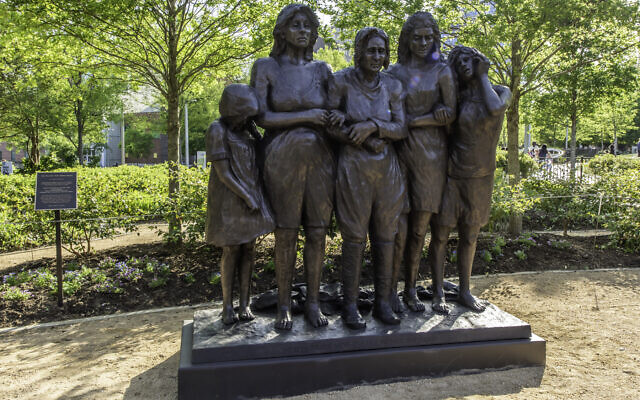
Growing up, Debra Weiner Cohen heard the harrowing stories about her mother’s life during the Holocaust. Hidden away among the straw and hay in the attic of a farmer’s shed for most of the war, Shelly Weiner, along with her mother, aunt and first cousin, survived despite unbelievable odds and a few near captures.
Cohen, who has lived in Atlanta for almost 40 years, and her sister, Donna Freedman, an Atlanta resident since 1982, know that their mother was one of the more “fortunate” ones. She survived. Their great uncle, other great aunts, cousins, a great-grandfather, and a great uncle were among their relatives murdered during the Holocaust simply because they were Jewish.
“We didn’t know the details until we were older, but we knew my grandmother and great aunt fought the Nazis in their own way. Prior to hiding, my great aunt, Soma, would sneak out of the Rivne, Poland ghetto to get food for others. My grandmother was shot in the hand, in fact, as she tried to stop a Nazi from shooting a man trying to bury his twin sons. In an act of defiance, my grandmother held up her hand and said, ‘No,’ right when the Nazis were seconds away from shooting him. They shot right through her hand, but the man lived and was able to bury his sons, thanks to my grandmother’s courage,” Cohen said.
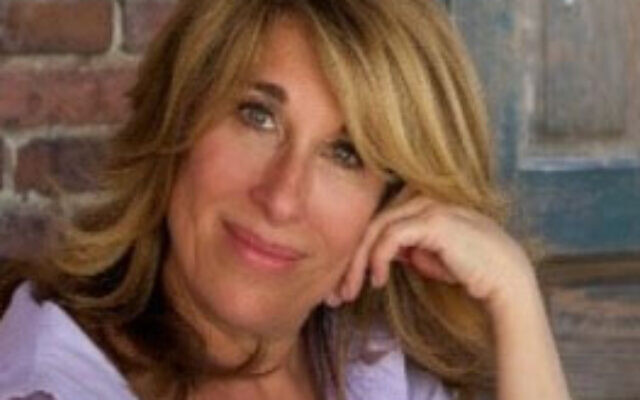
On April 18, during the commemoration of Yom Hashoah, Weiner exhibited the same determination and grit as her late mother, Eva Weiner, and aunt, Sofia (Soma) Guralnik, when she spoke at the dedication ceremony of “She Wouldn’t Take Off Her Boots,” a monument and memorial to honor the memory of her mother and great aunt. There, she was joined by her cousin, Rachel Kizhnerman, who was in hiding with her throughout the Holocaust.
Prominently located within Carolyn’s Garden in Greensboro, N.C.’s LeBauer Park, the 7-foot bronze sculpture is the first Holocaust memorial created specifically to honor the memory of the women and children of the Holocaust. Weiner and Kizhnerman hid most of the war in the farmer’s cramped attic, with food brought to them by members of his family; in a nearby forest with partisan fighters; and, later, in an underground hole dug by the farmer to protect all of them and his daughter. Most vividly, Weiner remembers the intense heat and cold, the dreadful living conditions in a space filled with lice and rats and feeling hungry most of the time. Yet, despite the harsh conditions, she and Kizhnerman are most thankful they evaded the Nazis for more than two years and escaped with their lives.
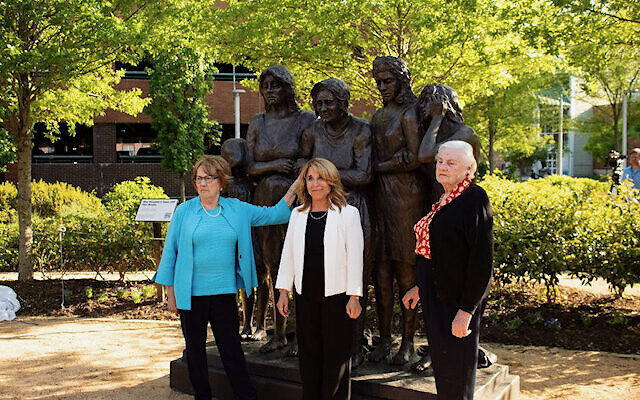
Weiner – strong, humble, and gracious to the core — has never forgotten her experience and remains active in several Jewish organizations in Greensboro and internationally. Her pet projects have included Russian resettlement efforts, as well as fundraising and outreach to provide Moldovan teens and young adults with mitzvahs and weddings. She and her late husband, Frank Weiner, also sponsored Moldovan youth so they could come to the United States for an education at a Jewish boarding school. She regularly speaks about the horrors of the Holocaust to groups of students at schools throughout the Southeast, including in Atlanta, and she is a tireless fundraiser for the many causes near and dear to her heart. In fact, she contributed the lead gift that made “She Wouldn’t Take Off Her Boots” possible.
“When I was asked to get involved with this project, focused on the brave women of the Holocaust, I met with the incredibly talented artist and sculptor, Victoria Milstein, and offered a gift to get the work started. When Victoria saw my hands, she said she’d love to use my hands as the prototype for the women. I told her my hands are my mother’s hands, which made it all the more special. And then I got started calling my friends, neighbors, and family to contribute. The state of North Carolina and the Federation here have also been an integral part of getting this project off the ground,” said Weiner.
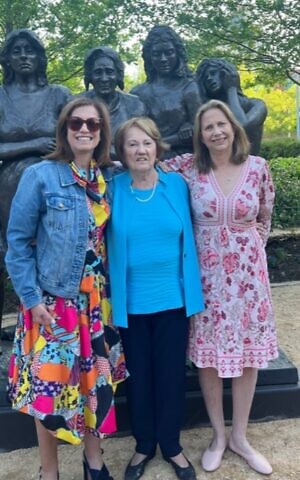
Milstein, a renowned artist and sculptor who currently lives in Greensboro, had a longtime vision for a Holocaust memorial dedicated to the women and children of the Holocaust. Her inspiration was found in a photograph she saw when it accompanied “Tell them I was not afraid,” a New York Times op-ed by Bret Stephens about Holocaust survivor Raya Mazin, his maternal grandmother’s first cousin. Milstein had been mulling over the idea of creating a piece of art about the Holocaust, and the photo she saw that day moved her to begin her work.
The photo, taken by a Nazi photographer, shows four Jewish women and a child moments before they were murdered. The group was part of a mass execution of thousands of Jews in Liepāja, Latvia, on Dec. 15, 1941. On that day, the women and children were taken to the women’s prison where they were forced to strip to their underclothes and shot dead in groups of 10.
“In this photo, I saw generations of women whose clothes had been taken away from them, right before they were brutally killed in the most savage of ways. Here was a matriarch who would not take off her boots and a family who was trying to maintain some measure of their dignity. Her gaze directly into the camera and the boots in particular strike me as an act of defiance that I wanted to capture,” said Milstein.
Milstein said the original impetus to create a piece that would memorialize the millions brutalized and killed during the Holocaust came to her during a trip with “March of the Living” to Auschwitz in 2018. March of the Living is an educational program that brings students from around the world to Poland where they explore remnants of the Holocaust.
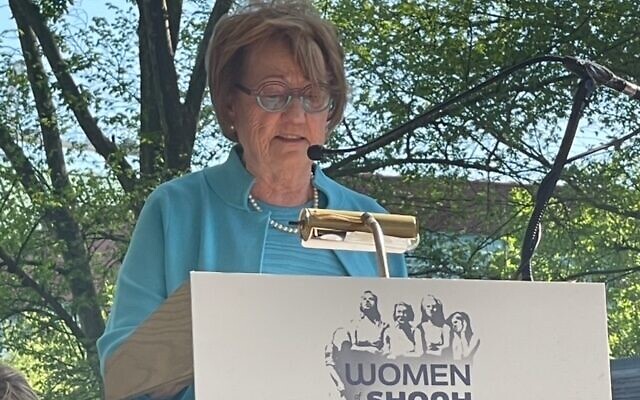
“During my time at Auschwitz, I heard the voices of the women calling out to me, imploring me to share their stories. Most of the women during the war were completely powerless since the Nazis had taken away their husbands and fathers much earlier. They were left to protect and shelter the children, which they did to the best of their abilities,” said Milstein.
During my time at Auschwitz, I heard the voices of the women calling out to me, imploring me to share their stories. Most of the women during the war were completely powerless since the Nazis had taken away their husbands and fathers much earlier. They were left to protect and shelter the children, which they did to the best of their abilities.
Attempting to capture their stories in “She Wouldn’t Take Off Her Boots” was a humbling experience, said Milstein, who sees artists as the proverbial ‘canaries in the coal mine,’ often serving as the storytellers for society. “I want to teach a wide audience about the dangers of hatred, which can impact any community and is as important today as it ever was,” Milstein emphasized.
Antisemitic incidents in the U.S. rose 36 percent in 2022, according to the most recent audit by the Anti-Defamation League. There were 3,697 tracked incidents of harassment, vandalism and assault targeting Jewish people and communities, the highest number ever recorded since the ADL first began collecting data in 1979.
Women of the Shoah, the non-profit organization (www.womenoftheshoahjp.org) that planned and coordinated all aspects of the project, had several notable speakers and attendees at the opening ceremony and via Zoom, including Israeli President Isaac Herzog; Rep. Kathy Manning (D-N.C.); the CEO of the International Civil Rights Center; City Council representatives; and rabbis. The organization’s goal is that the monument will serve as an educational and interactive experience so the public will remember the atrocities of the Holocaust.
Honoring the strength and resilience of women and making a definitive statement against antisemitism, genocide and all forms of racism and hate are equally important, said Milstein.
So, the legacy of the women murdered and left voiceless, depicted in the photo, lives on through this powerful monument. The marker next to the sculpture is a poignant reminder of what Milstein saw so vividly in the eyes of these women:
We will put our boots on.
We will resist.
We will be the witness,
Arm in arm.
We will build a more just society for all communities.
- Arts and Culture
- Community
- Debbie Diamond
- Debra Weiner Cohen
- Shelly Weiner
- Donna Freedman
- nazis
- holocaust
- Yom HaShoah
- She Wouldn’t Take Off Her Boots
- Rachel Kizhnerman
- Carolyn’s Garden
- LeBauer Park
- Victoria Milstein
- Sculpture
- Federation
- Memorial
- Bret Stephens
- Liepāja
- Latvia
- March of the Living
- Anti-Defamation League
- Women of the Shoah



comments